| Article ID | Journal | Published Year | Pages | File Type |
|---|---|---|---|---|
| 536413 | Pattern Recognition Letters | 2013 | 8 Pages |
Over the last decade, the development of high-throughput techniques has resulted in a rapid accumulation of protein–protein interaction (PPI) data. However, the high-throughput experimental interaction data is prone to exhibit high level of false–positive rates. It is therefore highly desirable to develop an approach to deal with these issues from the computational perspective. In this paper, we develop a robust computational technique for assessing the reliability of interactions by fast manifold embedding algorithm. A fast isometric feature mapping (fast-ISOMAP) is proposed to transform a PPI network into a low dimensional metric space, which recasts the problem of assessing protein interactions into the form of measuring similarity between points of its metric space. Then a reliability index (RI), a likelihood indicating the interaction of two proteins, is assigned to each protein pair in the PPI networks based on the similarity between the points in the embedding space. Validation of the proposed method is performed with extensive experiments on PPI networks of yeast. Results demonstrate that the interactions ranked top by our method have high functional homogeneity and localization coherence. Therefore, the proposed algorithm is a much more promising method to detect false positive interactions in PPI networks.
► The low-dimensional manifold modeling is adopted to fit a PPI network. ► A fast-ISOMAP is proposed to transform a PPI network into a low dimensional metric space. ► The proposed algorithm is able to uncover the intrinsic structure features of PPI network.
